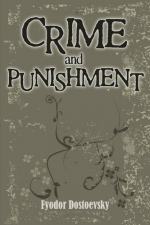|
|
Crime and Punishment Chapter 19
Raskolnikov's laughter, along with Razumihin knocking down a tea table, brings a certain lightness to the first encounter with Porfiry. Zametov is there as well. Raskolnikov explains to Porfiry his desire to redeem the pledges when he has the money. Porfiry stares knowingly, prompting Raskolnikov to think that this man knows about the murder. In answering Porfiry's questions, Raskolnikov finds himself uncomfortable. Yet, he feels an intense defiance against Porfiry and Zametov, who seem so disrespectful to him, who seem to be mocking him with their playful suspicions. Are they playing games with me? Raskolnikov asks himself. They will not get me-it's all suspicions and not facts, he tells himself. Porfiry tells Razumihin about the debate last night about the nature of crime. Razumihin resumes with his position that modern theories have taken the soul out of crime and have attributed everything to environment. Porfiry then turns to a discussion of Raskolnikov's essay, "On Crime" that was published in an academic journal (Raskolnikov did not know it was published; Porfiry had come across it by chance through an editor whom he knew).
Porfiry expresses his fascination with Raskolnikov's observations that crime is always accompanied by illness, and that there are some people who have the right to overstep the boundaries of morality and law. Raskolnikov clarifies his position: Extraordinary men have a right, through their inner conscience, to overstep certain obstacles for the benefit of mankind. Raskolnikov notes that all great leaders are in some form or another, criminals. His definition of the exceptional man is one who can give the world something new. He divides the world according to those who live under control and those who lead them. The semi-exceptional man who commit crimes for advancement is punished; the truly exceptional man who commits crimes of great magnitude are honored. It is an eternal battle, concludes Raskolnikov, till the New Jerusalem. Porfiry asks if he believes in the New Jerusalem. Yes, replies Raskolnikov. In Lazarus and the resurrection? asks Porfiry. Yes, again. How can you distinguish between the two groups-what if an ordinary man thinks himself extraordinary? asks Porfiry. It is the nature of the ordinary man to "impose various public acts of penitence upon themselves with a beautiful and edifying effect," Raskolnikov explains (p. 228). How many extraordinary men are there? asks Porfiry. They are extraordinarily rare, suggests Raskolnikov.
Topic Tracking: Redemption/Resurrection 5
Topic Tracking: Sin/Transgression 5
Razumihin cannot believe what he is hearing and inserts a remark that what troubles him is the sanctioning of bloodshed in the name of conscience. Porfiry jumps on this and asks what will happen to a youth who commits a crime, justifying himself by such a theory. Raskolnikov replies:
"If he has a conscience he will suffer for his mistake. That will be punishment-as well as the prison." Chapter 19, pg. 230
Topic Tracking: Sacrifice/Suffering 4
Razumihin asks whether or not the extraordinary man would feel a suffering of his conscience. Raskolnikov answers that any man with intelligence and heart should feel sorry, adding that great men must have great sadness on earth. As a last question, Porfiry asks Raskolnikov whether, in the act of writing the article, there was a sense of uttering a new word. And if so, could he be tempted to overstep certain obstacles if confronted with a situation where murder was justified? Raskolnikov is disgusted by the obvious trap. He tells Porfiry that he does not consider himself to be a Napoleon. Porfiry suggests that perhaps all men think of themselves as Napoleons sometimes. Perhaps a future Napoleon was the murderer of the old woman, adds Zametov. Raskolnikov stares at both of them as he prepares to leave. Porfiry suggests that Raskolnikov come to his office tomorrow to work out the details of the pledges. Raskolnikov asks whether he is being officially cross-examined. Porfiry replies that he has taken evidence of all who took pledges with the murdered woman, Raskolnikov being the only one unaccounted. Porfiry asks whether Raskolnikov had seen painters on the second floor the day he took the pledges. Recognizing that this is a trap, Raskolnikov answers that he did not see any painters. Razumihin is angry at Porfiry for asking a question about the painters who were present at the day of the murders when Raskolnikov took the pledges three days earlier. Porfiry owns up to the mistake and apologizes. Raskolnikov and Razumihin walk out without speaking.




